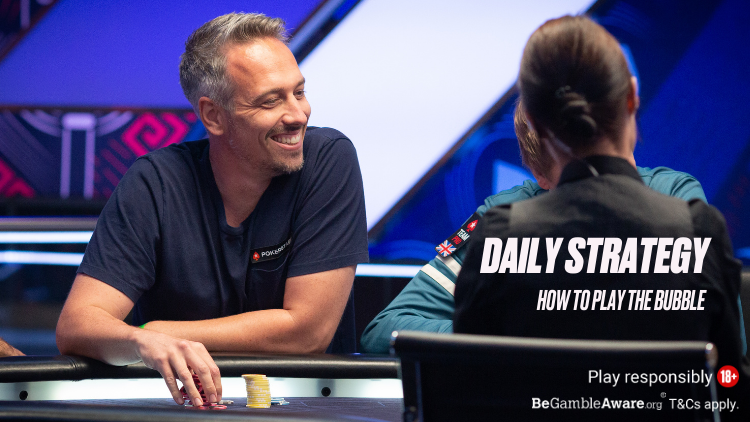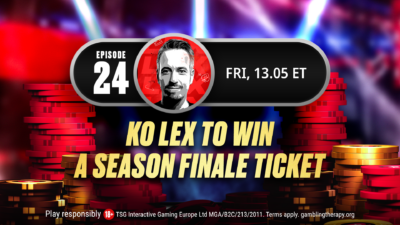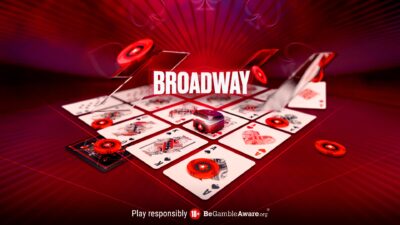Welcome to Daily Strategy, a series bringing you sound strategy advice from familiar faces for every stage of a poker tournament.
Nothing and I mean nothing, gets poker players more excited than a bubble that’s fit to burst.
It’s the only time you’ll see a throng of players crowding around a single poker table, violating the personal space of everyone sitting at it, sweating the turn of a card in a pot between people they’ve never met.
Making the money is the reason we all play poker tournaments, but bubbling a tournament? That’s the reason many players have stopped playing altogether.
So, what adjustments should you make when on a bubble? How can you apply pressure on your opponents? And what things should you look out for at your table?
One player who knows all of the above is Lex Veldhuis. The Twitch superstar has played more bubbles than you’ve had hot dinners and we could think of no one more suitable to provide you with your daily strategy.
It’s almost bubble time here at the EPT Barcelona Main Event.
Take it away, Lex.
HOW MUCH DOES THE CASH MEAN TO YOU?
I honestly think it all comes down to your financial situation. If the min-cash is €8,000 and you normally play $5 tournaments online, then this is a massive opportunity for you.
Ask yourself, how often will I get to this situation? Is the money life-changing for me? Is it career-altering in any sense? If that’s the case, just fold. Keep folding. I completely understand open-shoving pocket aces and pocket kings too, that kind of thing.
But if you don’t have to worry about the cash, I think what’s most important is looking at what the actual purpose of your all in is.
Let’s say you have 16 big blinds and you’re in the big blind with ace-queen, then the small blind sets you all in. You might want to fold because you’re close to the bubble. The field is so big, right? In this EPT Barcelona Main Event, there are going to be 327 players in the money. That means there are around 40 tables. It’s going to go so fast with people busting and there’s a big chance there’s going to be queens vs jacks, that sort of thing. So you might want to just throw the ace-queen away.
But at the same time, if you can win a 100-big-blind pot when someone goes all in against you, now all of a sudden you have a much bigger chance of winning the tournament. Sometimes it’s crazy and you have to wager a bigger stack because the opportunity afterwards is going to be bigger as well.


The chaos of a bubble
CHANGING YOUR PLAY
Don’t panic. I think the worst thing you can do is get into situations and then play them half-assed. You might be like: ‘’Oh, I should play the ace-jack’ but when the board comes jack-high, all of a sudden you’re going to take it super slow. Just be clear with yourself on what kind of hands you want to go for.
Also, play hands that have blockers. I would rather play king-jack offsuit than ten-nine suited near a bubble, for example, because you block a lot of good hands. Whereas with the ten-nine suited, you don’t block any hands that might punish you on the bubble.
Now let’s say you have a big stack on the bubble.
When you get there, just look for blockers. Play a lot of king-X suited and ace-X suited. You need to block those aces and kings on bubbles, and it’s a similar strategy when you’re on a final table. You mix out the suited connectors because they don’t do anything for you. You’re not looking for the playability of hands, you’re looking for what good hands the other players can’t have. That becomes vastly more important.


Lex Veldhuis
READING YOUR OPPONENTS
[Googling the players on your table] is probably smart, but it’s really hard to make decisions based on the unknown. You might see that someone on your table has no cashes [on Hendon Mob], but that doesn’t mean that this min-cash means a lot to them. It might be their first tournament and they just bought in for €5K and they’re just not going to fold ace-nine offsuit because it’s an ace. It’s always dangerous to make decisions based on the unknown.
There’s a lot more you can get from the way they’re acting, and how many times they look at the clock. That would mean a lot more to me. If a player has $2 million in live earnings but they keep checking how many players are left, they could be some math wizard but they could also be someone who’s nervous and has grinded their whole life. Look at their attitude at the table and see how relaxed they are.
TO TANK OR NOT TO TANK?
I’m not a big fan of tanking in live poker. Actually, I hate it. A lot of things are allowed in poker that aren’t very good for the game and the experience. I have zero issues with online tanking because people are behind a computer, they could be watching Netflix or something, it doesn’t have to be an unpleasurable experience. But if everyone starts tanking for a minute or two live, it becomes a really bad experience for players.
Maybe in the future, we’ll go to a system where we get told we’re 40 people away from the money but not when the bubble burst, so all of a sudden you get told you’re in the money.
THE TWO BUBBLES THAT STILL HAUNT LEX
I remember two bubbles vividly.
One was a really big sweat in the $40K event at the WSOP in 2009. It was a $75K bubble. I had Sami Kelopuro to my left and it was a complete nightmare. I really felt the tension at that moment, to the point where I didn’t want to be dealt a playable hand. On the bubble, you either want the top of your range or dogshit hands. You don’t want to get the queen-ten suited and stuff because then you feel you have to play it.
I also remember a tournament in Vegas, a $15K buy-in, and we were three from the money with 140 people cashing. I went all in with ace-ten off in a re-steal spot, which I still regret. It showed a complete lack of knowledge on bubble play, you know? Just fold! It’s a symbolic hand for my immaturity and has always been a painful one.
IF YOU FIND YOURSELF ON THE FEATURE TABLE DURING THE BUBBLE…
I’m used to that with streaming. I think it keeps you honest, in a way. Those spots actually made me get better. I would be on a bubble on stream in a spot where I could go two ways, and it’s a really big bubble, and I’d realise wow, I don’t really know what the right thing to do would be here.
Having the vulnerability of streaming and playing cards-up has made me study more. When you know the answer you have a lot of calm. You know that this hand I open, this hand I call, etc. The situations you look back on and regret are the ones where you didn’t know what to do. That insecurity needs to be channelled into an emotion, and sometimes that’s anger or disappointment.
CONGRATS ON MAKING THE MONEY!
NOW DON’T THROW YOUR TOURNAMENT AWAY…
The best thing to look at is the next money jump.
Let’s say that 30 eliminations after the bubble has burst, there’s a €5K money jump. Those 30 players are going to go out in like, 20 minutes, so you just need to chill.
I remember at the PSPC, it was huge and everyone sweated the bubble really hard. There were so many people with 1-5 big blinds. Then the bubble burst and I remember Spraggy cashed for $20K more because he just didn’t play hands for, like, five hands.
So if the next money jump is far away, just go with the hands you should go with. But either way, reassess, calm down, and don’t do anything rash.
Back to Top







